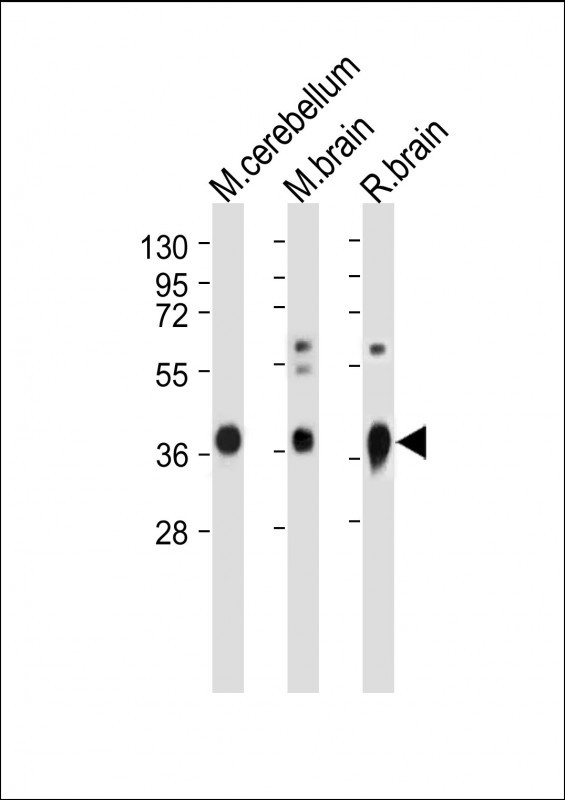
| WB | 咨询技术 | Human,Mouse,Rat |
| IF | 咨询技术 | Human,Mouse,Rat |
| IHC | 咨询技术 | Human,Mouse,Rat |
| ICC | 技术咨询 | Human,Mouse,Rat |
| FCM | 咨询技术 | Human,Mouse,Rat |
| Elisa | 咨询技术 | Human,Mouse,Rat |
| Aliases | Guanine nucleotide-binding protein G(o) subunit alpha, GNAO1 |
| Entrez GeneID | 2775 |
| WB Predicted band size | 40.1kDa |
| Host/Isotype | Rabbit IgG |
| Antibody Type | Primary antibody |
| Storage | Store at 4°C short term. Aliquot and store at -20°C long term. Avoid freeze/thaw cycles. |
| Species Reactivity | Human, Mouse, Rat |
| Immunogen | This GNAO1 antibody is generated from rabbits immunized with a KLH conjugated synthetic peptide between 291-320 amino acids from the C-terminal region of human GNAO1. |
| Formulation | Purified antibody in PBS with 0.05% sodium azide. |
+ +
以下是关于GNAO1抗体的3篇参考文献,包含文献名称、作者及摘要内容概括:
---
1. **文献名称**:*GNAO1 encephalopathy: Broadening the phenotype and evaluating treatment and long-term outcomes*
**作者**:Nakamura K, et al.
**摘要**:本研究探讨了GNAO1基因突变导致的神经发育障碍,通过抗GNAO1抗体检测患者脑脊液及脑组织样本,发现蛋白功能异常与严重运动障碍(如肌张力障碍和癫痫)相关,提示抗体检测在疾病分型和治疗评估中的潜在作用。
---
2. **文献名称**:*Autoimmune encephalitis with GNAO1 antibodies: A novel pediatric neuroinflammatory disorder*
**作者**:Armangue T, et al.
**摘要**:首次报道在儿童自身免疫性脑炎患者中发现抗GNAO1自身抗体,临床表现为急性运动障碍和精神状态改变。研究通过免疫组织化学和细胞实验证实抗体的致病性,为靶向免疫治疗提供依据。
---
3. **文献名称**:*Characterization of a monoclonal antibody specific to GNAO1 and its application in neurological disease models*
**作者**:Smith JL, et al.
**摘要**:开发并验证了一种高特异性抗GNAO1单克隆抗体,用于小鼠和人类脑组织切片中的蛋白定位研究,揭示GNAO1在突触传递中的动态表达变化,为研究其病理机制提供工具。
---
如需进一步扩展或调整,请提供更多具体需求!
The GNAO1 antibody is associated with the GNAO1 gene, which encodes the Gαo subunit of heterotrimeric G proteins. These proteins mediate intracellular signaling by coupling G protein-coupled receptors (GPCRs) to downstream effectors. Gαo is highly expressed in the central nervous system, particularly in neurons, where it regulates ion channel activity, neurotransmitter release, and synaptic plasticity. Pathogenic variants in GNAO1 are linked to neurodevelopmental disorders, including early-onset epilepsy, developmental delay, and movement disorders such as dystonia and chorea.
Antibodies targeting GNAO1 are primarily research tools used to study its expression, localization, and function in neurological tissues. However, anti-GNAO1 autoantibodies have been implicated in rare autoimmune encephalitis cases, contributing to neuropsychiatric symptoms and movement abnormalities. These autoantibodies are detected via cell-based assays or immunohistochemistry in patient sera or cerebrospinal fluid, though their clinical significance remains under investigation.
Research on GNAO1 antibodies also focuses on understanding how Gαo dysfunction—whether due to genetic mutations or autoimmune targeting—disrupts neural circuits. Studies using animal models and patient-derived cells highlight its role in cAMP signaling, calcium modulation, and cytoskeletal dynamics. Despite progress, therapeutic strategies targeting GNAO1-related pathways, including immunomodulation for autoimmune cases, remain experimental. Further research is needed to clarify diagnostic utility and mechanistic links to disease phenotypes.
×